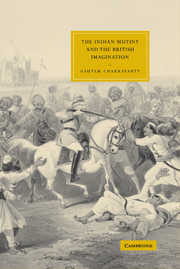Book contents
- Frontmatter
- Contents
- Acknowledgements
- Glossary
- Introduction
- 1 From chronicle to history
- 2 Reform and revision
- 3 Romances of empire, Romantic orientalism and Anglo-India: contexts, historical and literary
- 4 The ‘Mutiny’ novel and the historical archive
- 5 Counter-insurgency and heroism
- 6 Imagining resistance
- Epilogue
- Notes
- Bibliography
- Index list
- CAMBRIDGE STUDIES IN NINETEENTH-CENTURY LITERATURE AND CULTURE
Epilogue
Published online by Cambridge University Press: 22 September 2009
- Frontmatter
- Contents
- Acknowledgements
- Glossary
- Introduction
- 1 From chronicle to history
- 2 Reform and revision
- 3 Romances of empire, Romantic orientalism and Anglo-India: contexts, historical and literary
- 4 The ‘Mutiny’ novel and the historical archive
- 5 Counter-insurgency and heroism
- 6 Imagining resistance
- Epilogue
- Notes
- Bibliography
- Index list
- CAMBRIDGE STUDIES IN NINETEENTH-CENTURY LITERATURE AND CULTURE
Summary
In The New Zealand Wars and the Victorian Interpretation of Racial Conflict, James Belich makes an observation that is relevant to the ways in which the rebellion was received and circulated in British opinion for, at least, ninety years. On the internal coherence of the network of meanings through which settler and metropolitan opinion perceived the war against the indigenous peoples of New Zealand between 1845 and 1872, Belich writes that the
dominant interpretation [of the Maori war] can be understood as a system and as a framework. It was not systematic in the sense of an artifice or conspiracy; there was no collective and methodical censorship, no conscious plot to deceive. But it was systematic in the sense that it operated according to a discernible pattern which, broadly speaking, remained constant from case to case. It was also systematic in the sense that its component parts formed an integrated whole.
A similar ‘dominant interpretation’ is visible in the case of British writing on the rebellion, too; and this book has primarily attended to the network of plots, redactions, myths, politics and cultures that contributed to and sustained the British view of the events between 1857 and 1859. Precisely for that reason, this study has not addressed the substantial body of Indian writing on the rebellion; for to have done so would have required another methodology and distracted from the reconstruction of the dominant.
- Type
- Chapter
- Information
- The Indian Mutiny and the British Imagination , pp. 181 - 183Publisher: Cambridge University PressPrint publication year: 2005

